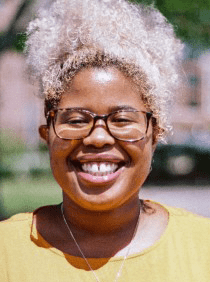By: Anna Miller (she/her)

The US has seen an erosion of public trust throughout the pandemic. This erosion is the result of misinformation, mixed messaging from leaders, and rapid changes in our knowledge of COVID-19. The Nascent Transcript had the opportunity to sit down with PhD Candidate, Markia Smith (she/her) a 4th year PhD Candidate at the University of North Carolina at Chapel Hill where she uses integrative genomic approaches to study environmental and epidemiological factors of cancer that lead to health disparities in historically marginalized populations. She is also the co-organizer and current President of Black in Genetics (twitter @BlackInGenetics), an organization that amplifies the voices and work of Black-identifying geneticists. You can follow Markia on Twitter at @MarkiaASmith.
How did you first get involved in science outreach and advocacy?
I first became involved in science outreach and advocacy in high school through my participation in Science Olympiad and a high school summer internship at the University of Delaware Chemistry and Biochemistry Department. I was exposed to science early on, but the rest of my friends in high school hated science so I saw an opportunity to share my love of science with my community. Upon matriculation into undergraduate, I continued my efforts by participating in several clubs on campus such as the American Society for Biology and Molecular Biology (ASBMB). I also founded a club dedicated to creating community for first generation college students where I was able to mentor and worked to increase interest in STEM.
What are your goals for Black in Genetics?
Currently, our goals for Black in Genetics are to increase community engagement and outreach. We want to bolster and strengthen our community so they can have access to not only community but resources and opportunities that are available.
Has your approach to outreach changed since the pandemic began?
My approach has been to meet people where they are. A lot of us are burned out, especially zoom burned out, so it’s important to create spaces that make people feel like it doesn’t require a lot of work to participate, and they can have fun. We’ve had to do much of our work virtually, but hope to eventually get to the point of having a large in-person retreat for our collective.
What advice do you have for other trainees interested in performing outreach?
My advice for other trainees is not to stretch yourself too thin because then you can’t be helpful to yourself nor others. Always place your health first and consider the time you have available to commit to performing outreach. Also, consider what is your mission and purpose so that along the way you can stick to your beliefs when you encounter different conflicts. Don’t forget why you started doing outreach in the first place.
What is something you’re working on that you’re excited about?
Something I’m super excited about is defending my dissertation this late Spring/early Summer. In terms of outreach, I, along with a colleague, proposed a session to The American Society of Human Genetics Conference and I’m super hopeful we will be picked.
Anything else you’d like to share?
The last thing I would like to share is our organization is looking for strong leaders and always open to people reaching out whether that be for an event or to just chat.
